The CHEMSEA newsletter is distributed a few times per year and is designed to keep you updated about project developments and results, as well as any upcoming events of interest.
Sign up and stay involved!

2013-09-16
The project “Towards the Monitoring of Dumped Munitions Threat” (MODUM) has been approved for financing by the NATO Science for Peace and Security (SPS). This international project will investigate the possibility of using Autonomous and Remotely Operated Underwater Vehicles (AUV and ROV) for the creation of a monitoring network for the dumpsites of chemical warfare materials in the Baltic Sea. It will cooperate closely with the CHEMSEA project in data and sharing and knowledge transfer.

2013-09-16
Students at the Warsaw University of Technology are building a remote controlled underwater robot, which will be used to investigate chemical munitions burried underwater in the Baltic Sea. The robot will be used to collect samples from munitions dumpsites and analyse the potential risks to the environment. Swimming along the bottom, it will help assess whether the munitions are corroding, open or leaking hazardous materials and will collect water samples for analysis in the lab. The goal is to design a robot that minimally disturbs the sea bottom so as to avoid moving silt, which distorts the images. The first version of the robot will be tested in the waters of the Baltic Sea in September.

2013-09-16
The recent 9th Baltic Sea Science Congress “New horizons for Baltic Sea science”, held in Klaipeda on 26-30 August featured a session on the topic of sea-dumped munitions. The session included presentations from a number of CHEMSEA partners. The abstracts can be downloaded here.

2013-09-16
Two documentary features - "Schlummernde Gefahr" (April 2013) and its extended version "Bombenalarm!" (June 2013) -were presented on German TV channel ZDFinfo. They deal with the topic of remnants of WWII munitions and highlight CHEMSEA's work, including footage from a research cruise on board the Walter Herrwig and interviews with CHEMSEA partners Thomas Lang and Matthias Brenner.
Another video feature, this one about the work of CHEMSEA's Military University of Technology and IOPAN appeared in Polish tvn24. The feature focuses on the discovery of what appears to be mustard gas in a sample collected from the Gulf of Gdansk and includes footage of CHEMSEA scientists at work during the research cruise as well as interviews with Stanisław Popiel.
2013-09-16
#Mr.EXI2T 
*EXI2T CYBER TEAM*
Indonesian Citizens
"What happened,we will be back again
we will not stop attacking!!!
.
We are EXI2T Cyber Team, |As long as we still have a keyboard and command troops on the internet. We are not invincible*!!!|Indonesia Defacer Rulez \m/
Greetz :
|#Mr.EXI2T|#Mr.BLACK-EX|Cyber00t|Nobody_Cares|./s3cre3t|Rizky21ID|Sync1337|MR.Y@N66A|#unknown378|Berandal|Mr.Luciferz|IM_Silent|/cLaW|LdxMpuzz66 |#MR.SnapHeat404|./cOLI|Blck0Wl|./MalamSunyi|./D14|DeathCreppy|
My Friend Team :
|EXI2T CYBER TEAM|CowoKerensTeam|Owl Squad|JONES UNLIMITED EDITION|Majapahit Team Cyber|T1KUS90T|L4dyExpr335| All My Friend
2013-09-16
On June 5th and September 29th CHEMSEA organised Open Day events in Stockholm and Klaipeda respectively. The events served as public fora to share and discuss information about the results of the project and served as opportunities to bring together maritime stakeholders. The Stockholm event was hosted by the Swedish Defense Research Agency and the Klaipeda event by the Lithuanian Environment Agency. The agendas and all presentations can be viewed here.
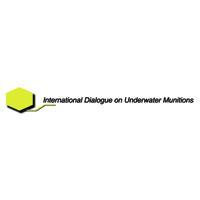
2012-12-19
A side event on sea dumped chemical weapons will take place on April 10, 2013 in The Hague during the 3rd Review Conference of the State Parties of the Chemical Weapons Convention. The International Dialogue on Underwater Munitions (IDUM) will co-organize this even in cooperation with the Governments of Lithuania and Poland, and the International Scientific Advisory Board (ISAB) on Sea Dumped Chemical Weapons. The event will include a networking reception followed by a bilateral meeting with stakeholders. Its aim is to promote the development of a practical platform of voluntary cooperation among all the relevant parties involved with sea dumped chemical weapons. The outcomes and the follow-up meeting in Nova Scotia will be presented at the United Nations Second Committee on Sustainable Development in December 2013. Click here for more information.
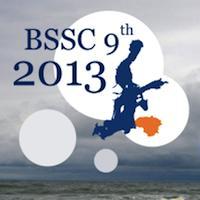
2012-12-19
The Baltic Sea Science Congress, to be held in Klaipeda, Lithuania, 26-30 August, is an international joint forum for researchers of the Baltic Sea region. The event brings together three major scientific communities: the Conference of Baltic Oceanographers (CBO), Baltic Marine Biologists (BMB), and Baltic Sea Geologists (BSG). This year, a special session will be held on sea dumped munitions in the Baltic Sea, including participation from several CHEMSEA partners.
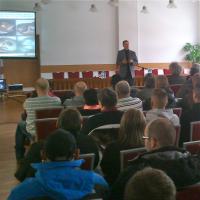
2012-12-19
The Polish Naval Academy conducted the first of a series of awareness trainings for fishermen. The training took place on March 11th in Krynica Morska and was attended by over 60 fishermen associated with The Pomeranian Fishermen Association.
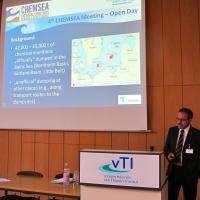
2012-12-19
CHEMSEA invited participants to an Open Day Event held in connection with the project conference on March 1st, 2013 in Hamburg, Germany. The event was hosted by the Thünen Institute of Fisheries Ecology (FI) and the Alfred Wegener Institute for Polar and Marine Research (AWI).
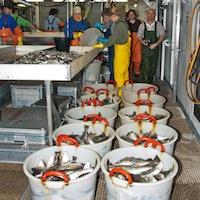
2012-12-19
This past December 2012, the Thünen Institute of Fisheries Ecology (FI) carried out the third CHEMSEA fish sampling campaign in the Baltic Sea onboard the RV Walther Herwig III to study ecological risks associated with dumped chemical munitions and warfare agents.
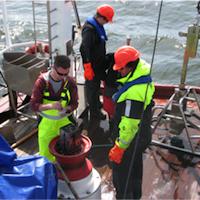
2012-12-19
This past September CHEMSEA concluded two sets of its characterisation cruises of munitions dumpsites in the Baltic Sea.
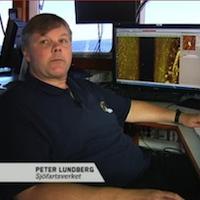
2012-12-19
In recent weeks CHEMSEA has remained a hot topic in the press and media broadcasts (particularly in the Swedish online press!). For a sampling of recent articles and broadcasts visit our CHEMSEA press page.
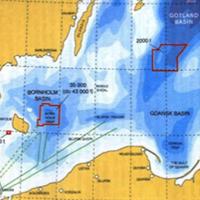
2012-12-19
Want to learn more about CHEMSEA’s early results? A number of reports are already available for download.
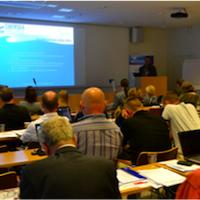
2012-12-19
This past September, CHEMSEA wrapped up three successful days of meetings in Helsinki, Finland including an open conference day with invited guests.
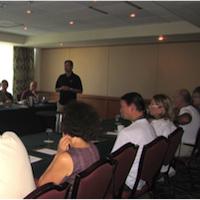
2012-12-19
The International Dialogue on Underwater Munitions (IDUM), an NGO promoting the creation of an internationally binding treaty on underwater munitions, held its international meeting in San Juan, Puerto Rico from September 27 to October 3.
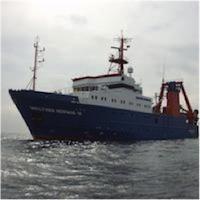
2012-12-19
This December, the Thünen Institute of Fisheries Ecology (vTI FOE) began its 3rd CHEMSEA expedition onboard the German R/V Walther Herwig III, heading for sampling sites in the CWA dumpsites of Bornholm Basin, Gotland Deep, Gdansk Deep and the Little Belt.
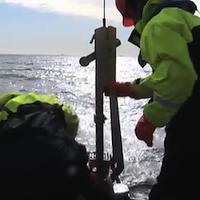
2012-09-10
The CHEMSEA and some of its key investigators have been featured in several print, radio and video stories.
VERIFIN’s Paula Vanninen was featured in an interview on Finnish TV for YLE 1 Finland.
CHEMSEA’s work was also highlighted in a radio piece for France Inter and a documentary video for Universcience.tv including interviews and footage from IOPAN’s March research cruise to the Gdansk Deep dumping site.
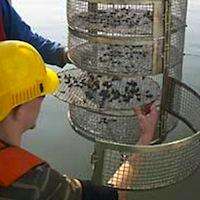
2012-09-10
The Finnish Environment Institute has begun a study at the chemical munitions dumpsite of Bornholm Deep intended to measure the accumulation of chemical warfare agents and their degradation products in the tissues of blue mussels as well as their biological effects.
The study began in late May, when eight mussel cages containing a total of 3200 mussels (Mytilus sp.) were deployed at various stations and depths at the Bornholm Deep site. The cages were left underwater until mid August, when they were recovered to conduct laboratory analyses of the mussel tissues involving a variety of biomarkers. The cages also contained a number of underwater instruments that recorded temperature, salinity and oxygen levels in the water. Stay tuned for preliminary results!
For more information contact Kari Lehtonen at the Finnish Environment Institute.
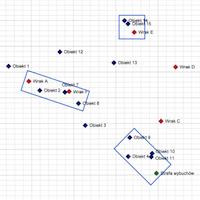
2012-09-10
This past March the Polish Naval Academy (PNA) conducted a research expedition to survey the munitions dumpsite at Gdansk Deep on the Polish coast. The cruise, conducted aboard the R/Vs Oceania and Imor, focused on gathering hydrographic data at the site and performing sonar measurements to detect objects on the sea floor. A total of 20 objects were selected for further examination, which revealed some metallic artifacts as well as some shipwrecks not marked on current nautical charts. The report for the cruise (in Polish) can be downloaded here: Report PNA Gdansk Deep March 2012 Cruise.
The next stage of research will involve sampling bottom sediments near the detected objects in order to investigate the concentration of chemicals.
For more information contact Bartłomiej Pączek at the Polish Naval Academy.
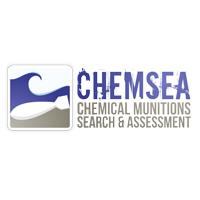
2012-09-10
This newsletter is designed to update you on developments relating to the CHEMSEA project and to the topic of chemical munitions in the Baltic Sea. It will keep you informed about ongoing project activities, results and publications, upcoming workshops and conferences as well as other means of staying involved. We hope you will come along with us!
The CHEMSEA project, funded by the Baltic Sea Region Programme, was launched in September 2011. It is a cooperation of leading scientific institutes, environmental agencies and maritime decision makers led by the Institute of Oceanology of the Polish Academy of Sciences (IO PAS) who have come together to assess and minimize the risks related to sea-bottom activities near the dumping sites of chemical munitions in the Baltic Sea. You can learn all about CHEMSEA on its website: http://www.chemsea.eu!
CHEMSEA partners have already come together twice for a project kick-off meeting in Sopot, Poland in September 2011 and a second meeting in Stockholm, Sweden in March 2012. During these workshops, partners jointly planned their upcoming work and held open days for invited stakeholders. Another meeting is planned for Helsinki, Finland on 11-13 of September with an open day for guests on 14 of September.
© CHEMSEA, IOPAN - wszelkie prawa zastrzeżone
Projekt i wykonanie - Virtual Services | Test zgodności W3C: HTML
Powered by: 